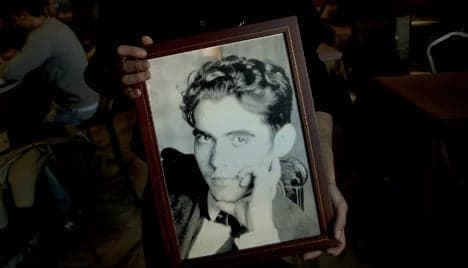Will it be third time lucky in quest to solve mystery of Lorca's grave?

An attempt to finally solve one of Spain’s most enduring mysteries is underway as archaoeologists try for a third time to locate the remains of the nation’s most celebrated modern poet and playwright.
Federico Garcia Lorca, the author of Blood Wedding, Yerma and the House of Bernada Alba, was executed by a Francoist hit squad during the first months of the Spanish Civil War and his body has lain in an unmarked grave somewhere on a hillside south of Granada ever since.
Lorca is widely believed to have been murdered, aged 38, by members of the Black Squadron who targeted him for his Left-wing views, Republican sympathies and homosexuality.
He and three others, including a one-legged school teacher and two local bullfighters, were said to have been shot at dawn on August 18th, 1936 and buried in the same unmarked grave on the edge of an olive grove.
During the last six years several attempts have been made to locate his final resting place resulting in exacavations by archaeological teams.
Ian Gibson, an Irish historian living in Spain and the author of a biography of Lorca, pinpointed a site as the likely location of the grave after interviewing a man who claimed to have buried him. But a 2009 excavation of that site proved fruitless.
Three years later and another historian, Miguel Caballero believed he had located the site of the true grave, some half a kilometre away after sifting through police and military archives.
But that search turned up nothing either, and archaeologists were forced to abandon the search as cold weather set in and funds ran dry.
But now once again, archaeologists are poised return to hillside to begin another dig, just centimeters away from the last one after their project was given an unexpected boost in the form of an anonymous donation.
Caballero, together with archaeology site director Javier Navarro Cheuca, are confident that this time they will find success.
"If (Lorca) is there, we will find him," assured Navarro, the head of the team of archaeologists, in El Pais. "We have advanced our knowledge of the terrain and with scientific exploration have been narrowing it down."
Historians believe some 130,000 people were killed by fascist death squads during the three year conflict and ensuing dictatorship that ended with the death of Francisco Franco in 1975.
Comments
See Also
Federico Garcia Lorca, the author of Blood Wedding, Yerma and the House of Bernada Alba, was executed by a Francoist hit squad during the first months of the Spanish Civil War and his body has lain in an unmarked grave somewhere on a hillside south of Granada ever since.
Lorca is widely believed to have been murdered, aged 38, by members of the Black Squadron who targeted him for his Left-wing views, Republican sympathies and homosexuality.
He and three others, including a one-legged school teacher and two local bullfighters, were said to have been shot at dawn on August 18th, 1936 and buried in the same unmarked grave on the edge of an olive grove.
During the last six years several attempts have been made to locate his final resting place resulting in exacavations by archaeological teams.
Ian Gibson, an Irish historian living in Spain and the author of a biography of Lorca, pinpointed a site as the likely location of the grave after interviewing a man who claimed to have buried him. But a 2009 excavation of that site proved fruitless.
Three years later and another historian, Miguel Caballero believed he had located the site of the true grave, some half a kilometre away after sifting through police and military archives.
But that search turned up nothing either, and archaeologists were forced to abandon the search as cold weather set in and funds ran dry.
But now once again, archaeologists are poised return to hillside to begin another dig, just centimeters away from the last one after their project was given an unexpected boost in the form of an anonymous donation.
Caballero, together with archaeology site director Javier Navarro Cheuca, are confident that this time they will find success.
"If (Lorca) is there, we will find him," assured Navarro, the head of the team of archaeologists, in El Pais. "We have advanced our knowledge of the terrain and with scientific exploration have been narrowing it down."
Historians believe some 130,000 people were killed by fascist death squads during the three year conflict and ensuing dictatorship that ended with the death of Francisco Franco in 1975.
Join the conversation in our comments section below. Share your own views and experience and if you have a question or suggestion for our journalists then email us at [email protected].
Please keep comments civil, constructive and on topic – and make sure to read our terms of use before getting involved.
Please log in here to leave a comment.